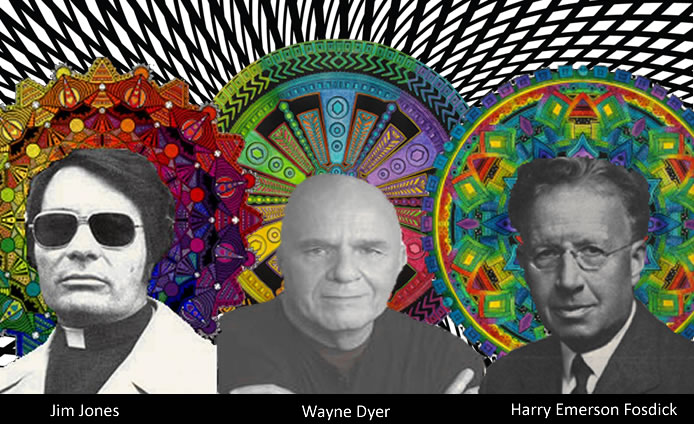
In his new book, Did Jesus Exist? Professor Bart Ehrman appears addicted to the fallacious “appeal to consensus.†He seemingly never tires of treating New Testament scholarship as a game of Family Feud. What hypotheses are to be taken seriously? “Survey says!†If the majority of scholars think A, then A must be the truth. But if one is feeling up to evaluating actual arguments, one will not refer to nose-count epistemology at all. One will not think to take refuge amid the herd. True, Bart no longer defends fundamentalism, but he is an apologist for a new orthodoxy, “mainstream scholarship,†the Society of Biblical Literature. I call this the “Stuck in the Middle with You†school of biblical scholarship, where nothing out of the comfortable bell curve of theories can be considered seriously. Berger and Luckmann well describe what Bart is up to: he is a “legitimator,†a public relations man for a professional guild.
The outsiders have to be kept out… If… the subuniverse [of meaning] requires various special privileges and recognitions from the larger society, there is the problem of keeping out the outsiders and at the same time having them acknowledge the legitimacy of this procedure. This is done through various techniques of intimidation, rational and irrational propaganda…, mystification and, generally, the manipulation of prestige symbols.[1]
This is, of course, why we see Bart (and other members of the academic elite, like Luke Timothy Johnson) trying to undermine the claims of “eccentric†Mythicists by throwing around talk of who has or doesn’t have official credentials and illustrious teaching posts. I know this sounds like sour grapes from me. I don’t perceive it that way (though who knows his own heart?), but even if it is, that only reinforces Berger and Luckmann’s point and the application of it to the case at hand, doesn’t it?
But there is a more serious misunderstanding implied in his ceaseless appeals to “what most scholars think.†And here I am thinking of Thomas S. Kuhn’s great book, The Structure of Scientific Revolutions.[2] Kuhn demonstrates how science advances at least as much by the formulation of new interpretive paradigms as by the accumulation of new data and discoveries. Copernicus had no new data when he rejected earth-centered Ptolemaic cosmology for sun-centered cosmology. He just found a simpler, more natural, economic, and comprehensive way to construe the evidence everyone already possessed. There was the little problem of the retrograde motion of the planets. Usually they seemed to trace a circular course around the earth, but on occasion they seemed to take a step or two backward, shuffle around a bit, then continue on their circular course. Why? Ptolemaic astronomers posited that the planets were, so to speak, poised atop a fantastic array of meshing gears and wheels which kept them going but with a kind of “leap year†jog every once and a while. It was still regular and in principle predictable once you had worked out the schematics. But what a mess! Copernicus realized it would all be much simpler if, say, the earth and the planets revolved around the sun. That way, the retrograde motion would be the result of our watching the motion of the other heavenly bodies from a moving platform. Bingo!
Martin Luther condemned Copernicus as a madman, but he was like Nietzsche’s madman in The Gay Science: he was right, but he came too soon. It would take a good while till his public could catch up with him. The same thing happened, for instance, with Alfred Wegener, who first proposed the theory of Continental Drift. He, too, was dismissed as an eccentric, though everyone now knows he was right all along.
           Why do new theorists often face such opposition from the scientific establishment? It is facile to vilify the “mossbacks†who just have too much invested in the way the game is currently played and are not willing to change the rules. Are they just dealing with cognitive dissonance by fending off a new theory that would mean they had been wrong? These things may actually be true, though to pass such a judgment one would really have to be a mind-reader. But it makes no difference. The new theorist must run the gauntlet, because his theory must be able to prove itself. For the scientific establishment to jump on the bandwagon at once would be to jump the gun. The theorist will (or should) be only too happy to submit his theory to exhaustive scrutiny (as Paul is depicted doing in Galatians 2:1-2). Isn’t that the essence of scientific method? You don’t want anyone to take anything by faith. You try to debunk your own theory, because that is the only possible way to see if it’s got what it takes. If it does, we can expect that the new paradigm will eventually receive recognition, just as Copernicus’s and Wegener’s did. Here we see the proper and valuable role of scholarly consensus. And it means that finding oneself in a tiny minority advocating a theory does not mean one is a weirdo and a crank. You might be, and there are plenty of them, but no one will be able to say so for sure until the elders of the scholarly establishment get busy scrutinizing the theory. This is what Bart discourages with his Steve Harvey-like appeals to majority opinion. Frank Zindler, Earl Doherty, Rene Salm, myself and the other Mythicists he seeks to refute might be Immanuel Velikovsky, sure, but we might be Alfred Wegener. It’s too early for Bart to tell. The fact that we form a tiny minority doesn’t by itself mean a damn thing.
           I don’t want to be unfair. Bart does after all deal with many Mythicist arguments, but it seems clear to me he is simply not ready to “think outside the box†of his SBL peers. Again and again, as I read the book, I realized that he and I occupy different universes of biblical criticism. He believes the “lucky seven†Pauline Epistles to be authentic and holds to what I regard as unrealistically early (apologetics-derived) dates for the gospels. He thinks the canned speeches in Acts preserve facts about Jesus even though careful vocabulary and conceptual studies by Earl Richard[3] and others have shown them all to be the work of the Acts author. By contrast, I am a student of the classic Higher Critics (e.g., F.C. Baur, D.F. Strauss, Wilhelm Wrede, Rudolf Bultmann, Walter Schmithals) and the more extreme Dutch Radical Critics (especially Willem Christiaan van Manen and L. Gordon Rylands).
           Like many neo-conservative New Testament scholars today, Bart is on the one hand unwilling to entertain the possibility of textual interpolations in the early decades from which no manuscript evidence survives at all;[4] while on the other, he is willing to trim away the more blatant marks of Christian interpolation from the Testimonium Flavianum (what Josephus supposedly says about Jesus) as scribal embellishment because it would allow him to take what’s left as a genuine testimony to Jesus. Not that he thinks it would prove much in either case—or does he? Depends on what page you are reading. Similarly, he accepts the claim of Papias, second-century bishop of Hierapolis, that he met people who claimed to be acquaintances of Jesus’ disciples, even though he himself rejects everything Papias claimed to have learned from them about the authorship of the gospels. Nor does he mention Papias’ cartoonish account of the grotesque swelling of Judas Iscariot before he exploded, something that surely ruins the good bishop’s claim to any credibility. Do I remember correctly that Bart wrote a book[5] on fraud and forgery in the New Testament?
           The methodological error here, trying to make bad evidence into good, is a sort of cousin to the error bemoaned by D.F. Strauss[6] so long ago, according to which Protestant Rationalists supposed that, though the major point of a miracle story, the supernatural event, might be rejected, other, tangential features might nonetheless be genuine historical data. Strauss rejected this, pointing out that the ancillary details were there only for the sake of the story’s main point and that it was arbitrary to maintain the former while rejecting the latter. That is essentially Bart’s strategy in the case of the speeches in Acts, the Josephus text, and the Papias traditions. He has no business picking up the scraps. He has to throw the bathwater out once he has ejected the baby. But he won’t.
           Did Jesus Exist? makes repeated fallacious appeals to authority and majority opinion, nor is he loathe to loathe. That is, he aims ad hominem attacks like Cupid’s arrows. Personally, I do not appreciate it when he invites the reader to write me off as a bitter ex-fundamentalist, implying my work is mere rationalization of my apostasy. He mistakenly thinks I used to be an evangelical preacher. I did spend a dozen years as a born-again Christian, but I became disillusioned with it precisely because, against my every hope and desire, I found I could no longer accept the apologetical arguments for gospel accuracy and biblical authority. What irritation my writings display expresses my righteous indignation at the bogus argumentation of the conservative writers. I suspect that Bart has occasionally felt the same way. But at the end of the book he writes all of us Mythicists off as merely pursuing an anti-religious agenda. Is he a mind reader? Does it not occur to him that our embrace of radical criticism might have helped lead to our disillusionment with faith rather than being an after-the-fact rationalization of it? Bart sounds like “Scientific Creationist†fundamentalists who charge scientists with believing in evolution merely as a way to escape repenting and believing in God.
           When I first discarded evangelicalism (years before I became a church pastor) I held views almost identical to those Bart espouses today: Jesus was an apocalyptic prophet much as Albert Schweitzer described him. And these views were for me no more a function of my rejection of faith than they are for Bart. Again, like him, back then I viewed the arguments of G.A. Wells (at the time a Mythicist) with astonishment and skepticism. But as the years went by and I studied more and more perspectives neglected by most scholars I knew, I found myself going in a more radical direction, not because I found the notions particularly attractive, but because I could no longer accept the arguments of moderate critics. And I have paid the price for it professionally, not that I am complaining. Indeed, “the lines are fallen unto me in pleasant places.â€
           Let me turn to a very few places where I believe Bart gets me wrong or offers ineffective arguments against my views. Most often he just professes to find my arguments implausible or unpersuasive. There is nothing I can do about that. I have to rely upon my readers to make that call for themselves. I trust they will not merely take his word for it. But there are a few points, I say, where I really must raise an objection.
           First, he says I misunderstand the criterion of dissimilarity and embarrassment[7] when I employ it to urge the inauthenticity of this or that gospel saying or story. He says I do not get it, that the proper use of the criterion is to sift through the texts to find those that can jump the hurdles. We should accept, he says, gospel material that do not appear to be so similar to early Christian belief or to current Jewish material that it looks to have been borrowed from one or the other. Anything that does not match up with early Church or Jewish material must really be from Jesus, something distinctive, a point where Jesus differed from Judaism, or something he said that went over like a lead balloon, not picked up by Christians. And embarrassment (what Crossan calls “damage controlâ€)? The idea here is that certain features in the gospel material that gave later Christians theological headaches (Jesus receiving John’s baptism of repentance, Jesus denying he is good and therefore that he is God, his cry of dereliction from the cross, his admission of ignorance re the time of the end, etc.) must be historical, since Christians would never have made them up. (Thus embarrassment is a special case of dissimilarity: if some loose end is conspicuous by the chagrin it caused later Christians, it is dissimilar to their Christian beliefs and thus, ostensibly, could not have been derived from them.) The purpose of the criterion is indeed to help us winnow out the chaff and preserve the wheat. I know that.
           Can Bart possibly miss my point that none of the material passes the test? I think I am the first (though who cares?) to note that the basic axiom of form criticism throws a deep shadow over the usefulness of the dissimilarity/embarrassment criterion, and here’s why. Form critics argue that nothing would have been preserved in the process of oral transmission that was not useful for some purpose (catechetical, homiletic, ritual legitimization, polemical, etc.) of the early Christians. Nothing seems to have been preserved for the sake of abstract curiosity. Well, if that is so, then everything in the gospel tradition reflects early Christian interests or we would not be reading it now! And that means we cannot be sure anything was not fabricated to serve those interests. It’s not that we know the stuff was fabricated; it’s just that we can’t say it wasn’t, and that’s the point of the criterion, isn’t it? To show what wasn’t fabricated? And nothing passes the test.
Bart, like all mainstream critics, is less critical than he thinks, since he tacitly imagines all early Christians believed, thought, and practiced the same things. But they didn’t. What was embarrassing to one writer or one generation needn’t have been embarrassing to the one before. It is obvious, for instance, that Mark had no problem with a humble Jesus who could apply to John for a baptism of repentance or could tell the Rich Young Ruler not to call him good. Mark had no problem with Jesus being surprised at the lack of faith among his townsfolk, or with his inability to heal them. Matthew, however, did, so he changed it. The earlier version of faith is not necessarily historical fact. Bart seems to realize this when he recognizes the presence in Acts, Romans, etc., of vestiges of adoptionist Christology, the belief that Jesus was a mortal man subsequently adopted as God’s son, perhaps at his baptism, perhaps at the resurrection. This hardly means Jesus must actually have been adopted as God’s son somewhere along the line just because the notion undermines pre-existence Christology. It just means that an earlier belief was embarrassing to later believers. Likewise, just because Matthew wished Mark hadn’t depicted Jesus as being baptized in the Jordan confessing his sins doesn’t mean that it actually happened.
And this brings me to Bart’s lambasting my suggestion that the story of Jesus’ baptism might have been rewritten from that of the Persian prophet Zoroaster. Ehrman has two cheap shots to fire here. First, he complains that I can’t get my story straight, since elsewhere I claim all the gospel narratives were worked up from Old Testament originals. But I clearly state that there were other sources, too. Besides this, Bart admits that many gospel stories do seem to parallel various Old Testament tales, but he laughs the fact off, pleading that the stories may still preserve a core of historical material even though the tellers of these tales added scriptural form and color to them. What, pray tell, is left? Are you saying Jesus really did multiply food for the crowds and this led the teller of the story to make it look like the similar story where Elisha does the same thing? That won’t work: the only “detail†the two stories have in common is the central “fact†of the feeding miracle. And isn’t it obvious that the “peripheral†detail consists rather in the change from Elisha as the miracle worker to Jesus? In any case, if a gospel story and an Old Testament story look quite similar, isn’t the simplest explanation that the Jesus version has been rewritten from the Elijah, Elisha, or Moses version? Bart is not shaving with Occam’s Razor. He is positing superfluous, redundant explanations.
Second, he, like apologists, likes to seal off the sphere of biblical culture from the adjacent religious world. I can understand that bias on the part of conservatives who want to see Christianity flowing directly out of the Old Testament, without other tributaries, for theological reasons. But Bart allegedly no longer cares to defend such interests. Then why does he ignore the massive influence of Zoroastrianism on Pharisaic Judaism? Many scholars believe Jews derived belief in an end-time resurrection, the apocalyptic periodization of history, the notion of a virgin-born future savior, the idea of an evil anti-God, and an elaborate angelology from Zoroastrianism. The rabbis thought that Zoroaster was the same man as Baruch the scribe of Jeremiah! That means they were trying to legitimatize the Jewish assimilation of Zoroastrian themes during and after the Exile. T.W. Manson[8] suggested that the traditionalist Sadducees (“Syndics, Councilmenâ€) resisted these borrowings and labeled those who accepted them as “Pharisees†(i.e., “Parsees, Persians, Zoroastriansâ€) because of it. (Later the Pharisees redefined the term to make it a badge of honor: “Perushim†now denoting “Separatists, Puritans.†Am I such a nut for suggesting possible Zoroastrian influence on the baptism story?
           What I have just mentioned is an example of synchronic comparison: tracing possible influence from one phenomenon to another close to it in time and space. Bart gives me hell for my invocation of the fact that Hong Xiuquan, the 19th-century Taiping messiah in China, called himself “the younger brother of Jesus†as a possible parallel to the use of “brother of the Lord†for James the Just. Across so many centuries? Far-fetched, right? How can Bart not recognize a diachronic comparison (a comparison of analogous phenomena across time)? As I say quite clearly, the Taiping messiah obviously could not have been claiming to be the blood brother of Jesus unless he was Mel Brooks’s character the 2,000 Year Old Man. No, he used the title to mean he was the earthly manifestation of another hypostasis of the Godhead, just as Jesus had been. Such a title need not at all imply its holder was the brother of a historical Jesus, either in the first century or the 19th. I don’t see what’s so funny about that.
           Speaking of James the Just, Bart paints me as claiming that James was a fictional character, an artificial eponymous ancestor of a tribe, like the Old Testament tribal patriarchs whom the ancients posited, as Hermann Gunkel[9] argued, to cement alliances between hitherto-independent tribes. But Christians were not an ethnic group! Nor am I so stupid. I believe I made it pretty clear that the case of the Israelite, Edomite, and Ishmaelite patriarchs is a historical analogy for the hypothetical grafting together of James, a sect figurehead in his own right, and Jesus as brothers in order to facilitate the combining of the two sects. I would be much surprised if Bart did not believe that Luke’s connection of Jesus and John the Baptist as cousins is not exactly the same sort of thing.
           I cringe at his discussions of the attempted refutation of the dying and rising god myth by Jonathan Z. Smith as well as the obliviousness of Tryggve Mettinger[10] to the implications of his own arguments on the subject. I have dealt with these authors in detail elsewhere, in fact, in books Bart says he has read. He could at least have done me the courtesy of replying to the arguments. If he thinks they are stupid, too, he might have done the reader the favor of explaining why.
           It is interesting that Stanley Fish blurbs the book, thanking Bart for swatting Mythicism like the annoying fly it is. Bart’s book is a prime example of what Fish himself explains in his great book Is There a Text in this Class? There Fish shows how an argument over texts can be meaningful only between those who belong to same “interpretive community,†sharing the same assumptions and methods. [11] Catholics cannot really argue from scripture against Protestants, and vice versa, because one feels free to allegorize the text and the other doesn’t. A Structuralist and a Deconstructive critic talk past one another. It would be like two teams in a stadium, one playing baseball, the other football. Each community embraces its own paradigm, its own frame of reference which includes its own criteria for the plausibility of readings and arguments. A reading seems “natural†or “the plain sense†if it is the accustomed reading.[12] If you have always read it one way, no new reading can sound plausible to you. Unless of course, you make what Don Cupitt[13] calls “the leap of reason†and try to see it the other guy’s way. And then you may find it makes new sense to you.
I remember when I first heard there were scholars[14] who argued that the Sodom and Gomorrah story had nothing to do with homosexuality. At first my reaction was to scoff. But then the sheer outlandishness of it made me curious. Why on earth do intelligent people think this? I read and pondered their argument—and found myself convinced. At first I thought Deconstruction was the merest nonsense. But then I realized, “Listen, Price, there must be something to this, some game these people are playing, a method to the seeming madness. Let me find out what it is.†And I did, and I found it illuminating. And, need I say, I started out the same way with the Christ Myth Theory—outlandish! But the more I looked at it, the more astonished I was at the sense, better sense it began to seem, that it made of the evidence. Again, I am no mind reader, but Bart gives every indication of being someone who has not taken the requisite leap of reason beyond the boundaries (and the blinders) of his interpretive community. Certain ideas appear to him outrageous because he has never heard them, or never heard them taken seriously by those whom he deems to be serious scholars, serious precisely because they do not take seriously nutty notions like Mythicism.
So Says Zarathustra.

[1] Peter L. Berger and Thomas Luckmann, The Social Construction of Reality: A Treatise in the Sociology of Knowledge (Garden City: Doubleday Anchor Books, 1967), p. 87.
[2] Thomas S. Kuhn, The Structure of Scientific Revolutions.(Chicago: University of Chicago Press, 1962).
[3] Earl Richard, Acts 6:1-8:4: The Author’s Method of Composition. Society of Biblical Literature Dissertation Series 41 (Missoula: Scholars Press, 1978).
[4] He alleges that Christ Myth Theorists engage in the ad hoc strategy of what some call “surgical exegesis†or what Walter Kaufmann called “gerrymandering the Bible†(The Faith of a Heretic [Garden City: Doubleday Anchor Books, 1963], p. 109), writing off New Testament texts inconvenient for one’s hypothesis as later interpolations. I would refer him to William O. Walker, Jr., Interpolations in the Pauline Letters. Journal for the Study of the New Testament Supplement Series 13 (London: Sheffield Academic Press, 2001), pp. 18-19 and the material cited in fn 54, for 1 Cor. 11:23-26 as an interpolation. Walker is no Christ Myth kook. Nor was the late Winsome Munro who offers (as Walker does) definite criteria for spotting interpolations from the early period in her Authority in Paul and Peter: The Identification of a Pastoral Stratum in the Pauline Corpus and 1 Peter. Society for New Testament Studies Monograph Series 45 (NY: Cambridge University Press, 1983).
[5] Bart D. Ehrman, Forged: Writing in the Name of God – Why the Bible’s Authors Are Not Who We Think They Are (NY: Harper Collins, 2011).
[6] David Friedrich Strauss, The Life of Jesus Critically Examined. Trans. George Eliot (Mary Ann Evans). Lives of Jesus Series (Philadelphia: Forrtress Press, 1972), p. 55.
[7] You can’t beat the discussion of these criteria by Norman Perrin in his Rediscovering the Teaching of Jesus (NY: Harper & Row, 1976), pp. 39-47.
[8] T.W. Manson, The Servant Messiah: A Study of the Public Ministry of Jesus (Cambridge: Cambridge University Press, 1953), pp. 18-19.
[9] Hermann Gunkel, Genesis. Trans. Mark E. Biddle. Mercer Library of Biblical Studies (Macon: Mercer University Press, 1997), pp. xviii-xix.
[10] Tryggve N.D. Mettinger, The Riddle of Resurrection: “Dying and Rising Gods†in the Ancient Near East. Coniectanea Biblica Old Testament Series 50. (Stockholm: Almqvist & Wiksell International, 2001).
[11] Stanley Fish, Is There a Text in this Calss? The Authority of Interpretive Communities (Cambridge: Harvard University Press, 1980), e.g., pp. 171-172.
[13] Don Cupitt, The Leap of Reason. Studies in Philosophy and Religion 4 (London: Sheldon Press, 1976).
[14] Derrick Sherwin Bailey, Homosexuality and the Western Christian Tradition (London: Longmans, Green and Co., 1955), Chapter I, “Sodom and Gomorrah,†pp. 1-28.
 It is Good Friday as I write, but I am not attending church again this year. The symbols and rituals just don’t mean anything to me anymore. And my decades-long scrutiny of the (underlying? superimposed?) theological doctrines has made them seem altogether irrational and contrived (not simply unsubstantiated, which one might almost be able to forgive). The whole thing has done so much harm (even while it has given so much comfort and inspired so much goodness). Yet I do not “pray†(wish), as many atheists seem to do, that religion should perish from the earth. I do not wish religion had never begun. If, a la George Bailey in It’s a Wonderful Life, religion had never been born, I am quite sure something just as bad (and good) would have appeared to fill the same niche. It is not as if religion were some imposition from without, whether by ancient space aliens or fallen angels. Human nature cast it up and would again.
It is Good Friday as I write, but I am not attending church again this year. The symbols and rituals just don’t mean anything to me anymore. And my decades-long scrutiny of the (underlying? superimposed?) theological doctrines has made them seem altogether irrational and contrived (not simply unsubstantiated, which one might almost be able to forgive). The whole thing has done so much harm (even while it has given so much comfort and inspired so much goodness). Yet I do not “pray†(wish), as many atheists seem to do, that religion should perish from the earth. I do not wish religion had never begun. If, a la George Bailey in It’s a Wonderful Life, religion had never been born, I am quite sure something just as bad (and good) would have appeared to fill the same niche. It is not as if religion were some imposition from without, whether by ancient space aliens or fallen angels. Human nature cast it up and would again. on the coins. They could put “What, Me Worry?†on ‘em for all I care. To get upset over “In God We Trust†seems obsessive, neurotic, like Dracula cringing from the cross. “God†on the coins does not constitute a theocracy. It is not even a first step toward a theocracy. It is ludicrous fanaticism to get worked up about it. Do you as an atheist ridicule the scruples of first-century Jews who would not allow Roman coinage to be used in the temple? Well, you’re just as picky. Look, if you don’t want all those theophoric coins and bills, I’ll be happy to take them off your too-pure hands.
on the coins. They could put “What, Me Worry?†on ‘em for all I care. To get upset over “In God We Trust†seems obsessive, neurotic, like Dracula cringing from the cross. “God†on the coins does not constitute a theocracy. It is not even a first step toward a theocracy. It is ludicrous fanaticism to get worked up about it. Do you as an atheist ridicule the scruples of first-century Jews who would not allow Roman coinage to be used in the temple? Well, you’re just as picky. Look, if you don’t want all those theophoric coins and bills, I’ll be happy to take them off your too-pure hands.













